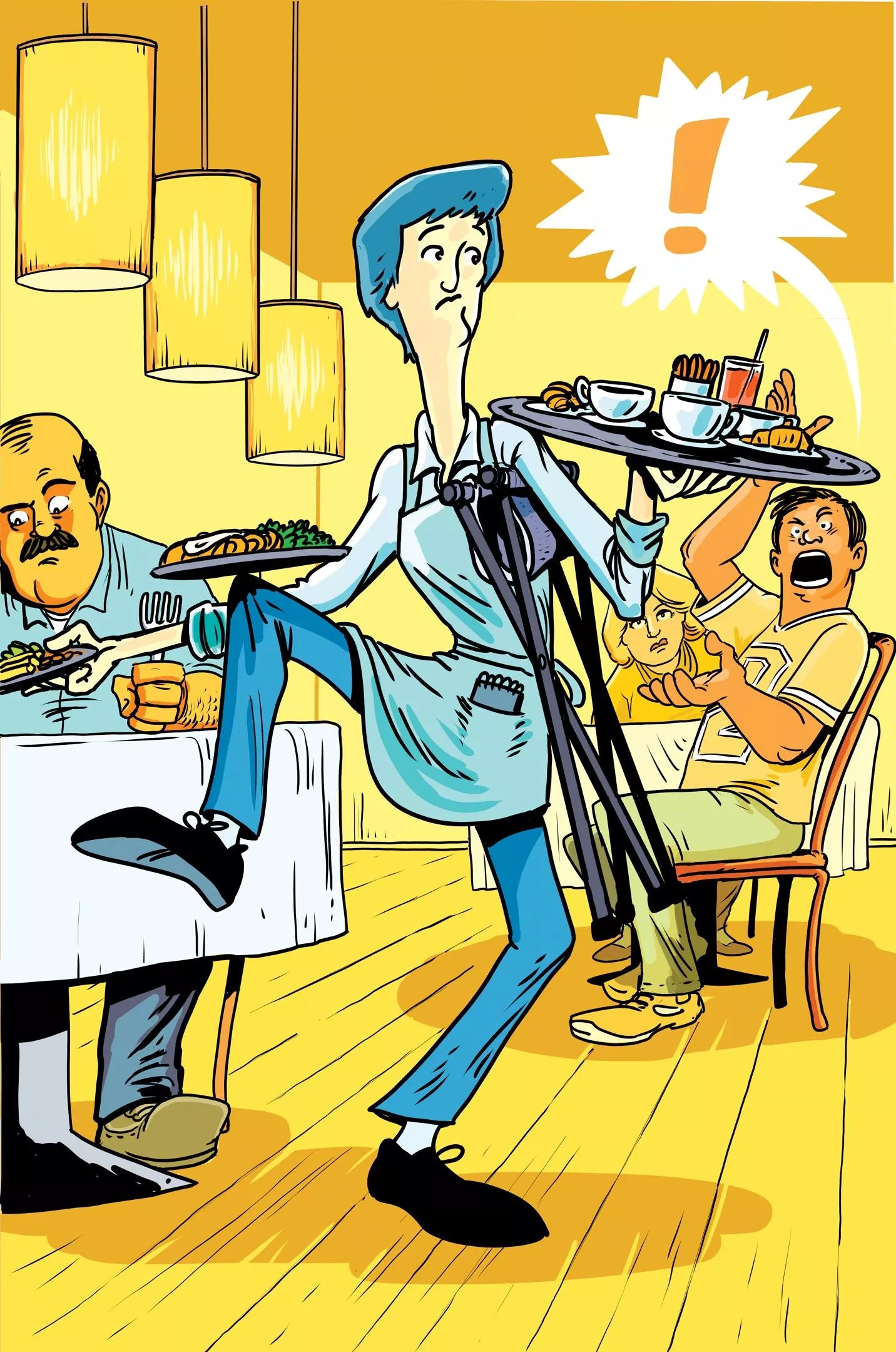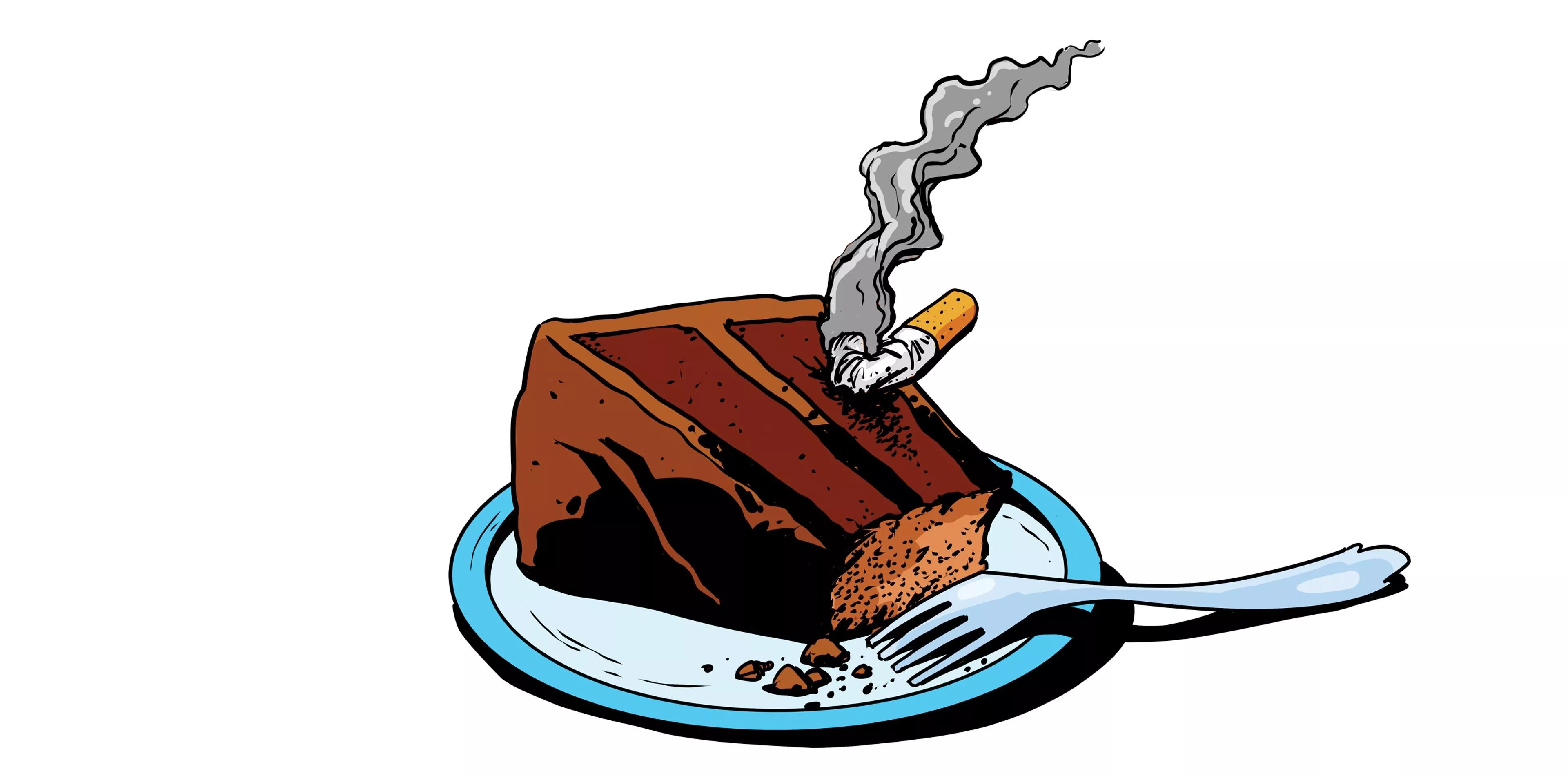
Illustration by Bryan Kelly

Audio By Carbonatix
On multiple days during the last four years, Clayton thought he’d reached a breaking point.
There was the time at CBD Provisions, an upscale restaurant in The Joule hotel, when his small mistakes in food prep were met with lacerating criticism from his coworkers. One seemed to have made it his mission to belittle Clayton at every opportunity, often getting in his face and demanding to know why he was still working there. Then there was the craze of “Barbenheimer,” when Clayton, then working at Alamo Drafthouse Cinema in Denton, suffered several breakdowns while he and his teammates tried to get out 400 orders in two hours. Most painfully, there was the 2021 death by suicide of his friend and fellow kitchen staffer. It was the third suicide among his friends since the pandemic began.
“He was a very kindhearted soul, which is unusual to meet in the kitchen,” Clayton says. In his experience “the men who end up thriving are not the best people.”
Clayton – not his real name – started working in restaurants in 2019. He has bused tables, worked on the line in kitchens and bounced between several restaurants in Denton and Dallas. He asked the Observer to use a pseudonym so he could speak freely about his experiences without fearing repercussions from employers. After leaving Alamo Drafthouse in July, Clayton returned a month later out of necessity.
“Staying through Barbie and Oppenheimer broke my brain … broke me inside,” he says. “You gotta draw a line somewhere, but some people can’t draw the line.”
Clayton says he has trouble sleeping and is often angry for no perceptible reason. The restaurant business has taken a sizable toll on his mental and physical health, just as it did for Lauren Belmore, who worked in the industry for eight years.
“I went to theater school, and restaurants are basically drama,” Belmore says. “It’s basically theater, which was very attractive to me. Big personalities, high tension.”
She worked her way up to manager and then head chef in a career that included stints at Spiral Diner in Denton, Snooze on Oak Lawn, Zoli’s Pizza in Addison and Oddfellows in Oak Cliff.
“You forget what life is like outside of it at some point,” she says. “If you’re a kitchen manager, the kitchen is your life. Your hobbies go away, and I developed a really unhealthy relationship with my phone.”
Like Clayton, she faced multiple days that, in hindsight, should have been the breaking point: the day she finally said “enough is enough” and, like so many of her peers, left the industry for good. She takes pride in never walking out on a shift, though, even if, as a chef, she rehired people who did that very thing to her.
“If you have a good guy, they can do anything and you’ll take ’em back,” she says. “I let guys ride the clock all the time. I had a brunch guy who was late, and when I called him, he said, ‘I’m in Royse City.’ If you’re in Royse City at 6:30 a.m., I know you’re either doing rails or shooting up. He was two hours late, but he still whipped out a great brunch.”

Workers in the dining industry are continually overworked and underpaid.
Illustration by Bryan Kelly
Belmore would later break free from the world in which she seemed stuck, but not before years of contending with the themes that have come to define kitchen work: toxicity, untenable hours and a complete lack of work-life balance. Those themes are a core part of the critically acclaimed, restaurant-centered television show The Bear, which Belmore has yet to watch in full but certainly finds relevant. And the show, through the legions of memes it has inspired, has raised awareness about the precarious position restaurants occupy.
According to data from the U.S. Bureau of Labor Statistics, employer demand and employee supply were in sync from 2000 through early 2020. Then March 2020 brought mass layoffs from which the industry has yet to recover. According to a National Restaurant Association report, staffing in the restaurant industry was 3.6% below pre-pandemic levels at the start of 2023, or 450,000 positions. And 80% of restaurant operators report they are having a hard time filling open jobs.
Yet the food service industry workforce was projected to grow by more than 500,000 jobs in 2023, surpassing pre-pandemic levels and putting more strain on an already overworked industry.
Betsey Stevenson, a professor of economics at the University of Michigan, summarized the industry’s problem for The Washington Post: Other industries offered better pay and more flexibility.
“Their workers have left to go somewhere else,” she says.
Meanwhile, there’s evidence this shortage is having an effect on customer opinion. In a survey from the software provider HungerRush, nearly one-third of respondents say their experience has worsened because of overstressed staff, while 57% say they are not confident their order will be taken correctly.
Interviews with chefs, owners and staffers like Clayton and Belmore indicate these problems are linked. Until the industry shakes its reputation for toxicity, employee and customer experience will suffer. Smaller, independent restaurants will struggle the most as they’re hard-pressed to find a consistent flow of qualified candidates. It’s incumbent upon overwhelmed chefs and managers to help people struggling with the burnout that’s become synonymous with the industry.
“There’s a shortage of people interested in coming into the industry, and that’s a big reason I hold everyone close to my chest,” says Janice Provost, the chef and proprietor of Parigi on Oak Lawn Avenue. “It’s easier to keep an employee than it is to hire a new employee.”
Plus, those who do enter the industry have different priorities than their predecessors.
“The new generation wants a life; they don’t want the 100-hour work weeks,” says veteran chef Sharon Van Meter. “Our industry is in a cycle that has to be broken. We’re dying for staffing.”
Troy Gardner, a longtime Dallas chef known for his vegan fare, can relate to Belmore: He, too, has kept people on his staff even when they’ve given him ample cause for firing. As he told the Observer in 2021, Gardner knew an employee was stealing cash, but he had no plans to fire him.
“It’s one part empathy, two parts necessity,” the chef said at the time. “Ironically, he’s one of my best employees, and I need him.”
When he was interviewed again in late 2023, Gardner confirmed he never fired that employee. In fact, he gave the guy a raise.
“I try to supplement that raise when I can,” Gardner says, and the employee also takes out loans regularly. “I’m very understanding of his situation. He works literally seven days a week. He works a day job at one place, then comes to us for his night job. He’s got two kids in college and another in high school.”
Silver Gordon, the general manager of Hamburger Mary’s, says this isn’t unusual.
“A lot of people in my kitchen are working two to three jobs,” he says. “Fifteen years ago I would’ve said, ‘You have to make this job a priority,’ but I really can’t do that anymore, because everyone’s gotta have two jobs to make it.”
Getting a raise after being caught stealing is not typical; it’s just one way Gardner is trying to figure out how to retain and care for his small batch of employees.
After the closures of his Trinity Groves restaurant V-Eats and his Garland ghost kitchen TLC Vegan Kitchen, Gardner opened TLC Vegan Cafe in Richardson in late 2022. He says he has tried to hire a manager for more than a year but so far has been unable to find one, so he’s handling manager duties himself. Despite the restaurant’s small size – 28 chairs inside and 12 outside – he has struggled to keep other positions staffed, too.
“Smaller restaurants, we’re just dying for staffing,” says Gardner, defining a “smaller” restaurant as one with 60 seats or less.
Bigger restaurants like Whiskey Cake have a revolving door, he says. Employees will leave after a month or so because another place is offering 30 cents more per hour, but a restaurant with that size, budget and name recognition will be able to replace people much easier than a restaurant like his. Smaller places can’t afford revolving doors; for the place to stay open, the door can really only go one way.
But it doesn’t.
“At small places, there’s only so far people can go,” Gardner says. “A lot of people don’t have a vested interest in sticking it out; there’s very little to no loyalty. Most of the people in the service industry are here out of complete necessity, or they really love it. You really only have two types; there’s not a whole lot of people in the middle.”

Servers are leaving the industry to protect their mental and emotional health.
Illustration by Bryan Kelly
Gardner has no other option, then, to create some loyalty. He doesn’t have a master plan for doing this. His approach mostly amounts to being the opposite of the obsessive, pugilistic chef as seen on TV. (“I’m a fucking psycho,” says Carmy Berzatto, the main character of The Bear. “That’s why I’m good at what I do.”)
While he may be acting as manager on a (hopefully) temporary basis, Gardner says he tries to delegate whenever possible, mostly because he has seen people respond well to the trust and respect that comes with more autonomy.
“You have to look at each person as an individual and encourage everyone to do the same,” he says. “In a kitchen, you have different ability levels, different self-awareness levels, and what makes toxicity thrive in close quarters is when one person feels they aren’t being valued, or another person thinks you’re playing favorites.”
Destiney, who has worked for Gardner for four years, says the chef succeeds at creating a healthy environment in a notoriously unhealthy industry. She fills multiple roles at the restaurant, including serving tables, handling the front of the house and managing customer complaints.
“Troy is the main reason why I like it,” she says of her work. “He’s one of the most caring and talented chefs I’ve come into contact with. I’m not afraid to go to Troy if I feel like one of my coworkers is being disruptive or rude, and I trust he will handle the situation.”
Fortunately, she hasn’t had to worry much about conflict with her teammates. Customers are another story.
Destiney says she is in therapy in part because of her seven years working in the restaurant business. She is engaged, and she wants to get healthier before she gets married and starts a family. One of the more stressful parts of her gig – and a frequent topic in therapy – is disrespect from patrons.
“It’s gotten worse in the last few years,” she says. “I think people don’t have patience anymore. They’re not really giving businesses grace. They think we’re robots and don’t have feelings or we don’t mess up at times. People make a mistake when you’re working in a restaurant; it’s easy to make a mistake.”
The boss has seen this lack of patience, too, and he knows it takes a toll on his team.
“So much of the anxiety and frustration comes from the lack of empathy on the customer side,” Gardner says. “You get so many over-the-top complaints that you wouldn’t expect anywhere, and I get it, because people are passionate about food. But I don’t know when it became OK to treat people horribly when they’re doing their best.”
This is a common sentiment among the people interviewed for this story, but once again, there appears to be no single remedy. The consensus is that chefs and owners must be out in front of the complaint; letting their people bear the brunt of a customer’s abuse is a surefire way to make burnout worse. Chefs are equally vexed about how to handle toxic employees – those people who follow the archetype of the “fucking psycho.” Staff shortages compound the problem. As Belmore and Gardner’s stories show, addiction and theft can be a problem.
“A happy kitchen is the ultimate goal,” Provost says. “On rare occasions, I’ve let people go because they treat people poorly. If there’s tension and drama in the kitchen, that affects everything.”
Provost wouldn’t elaborate on the specific reasons for those two firings, other than to say, “They weren’t polite. They weren’t Southern, let’s put it that way. You have to be able to effectively communicate with the front of the house and with your coworkers.”
Provost worked in telecom sales before her love of food led her to the culinary program at El Centro. Her first job in the restaurant world was as a prep cook at Parigi, and she eventually bought the place and installed Joel Orsini as the executive chef.
“I have to tell him, ‘Hold on, don’t get burned out,'” she says of the hard-working Orsini. “But I think he’s the unicorn; he doesn’t get burned out.”
She worries about others, though, particularly since she has had ample trouble filling openings on her team.
“Looking for people is unnerving,” she says. “You wonder, ‘Are they even going to show up for the interview?'” (They often don’t.)
One of the benefits of operating a chef-owned restaurant is that Provost can close whenever she leaves. Parigi closes for a week around July 4, emulating a European approach Provost heard about. The restaurant is also closed on Christmas Eve and Christmas Day. Provost doesn’t think that’s enough, though; she’s searching for more. She wants to continue the work she started with the Greater Dallas Restaurant Association and Les Dames d’Escoffier, a group that mentors women in the culinary world. Through the Parigi Scholarship Endowment Fund, she recently raised over $1 million in scholarship funds for culinary students, including students at her alma mater. And in house, at Parigi, she wants to create an apprenticeship model so employees can rise in the ranks like she did.
“We like to promote from within,” she says. “The fact that I was able to have female mentorship when I was so green had a major impact on my career, so I want to do the same.”

Some chefs are finding ways to create better work environments.
Illustration by Bryan Kelly
Van Meter, whom Provost cites as one of her mentors, says women have not received enough credit for the work they’ve done to shape Dallas’ culinary scene. Provost, Michelle Carpenter of Restaurant Beatrice and chocolatier Katherine Clapner are just a few of the people she says are bucking the archetype of the controlling, hot-tempered chef.
“I see a lot of gentler kitchens now,” says Van Meter, a former corporate chef at venues like the Ritz Carlton and Neiman Marcus. In 2022, she opened Beckley 1115 in Oak Cliff.
“I’m totally impressed by the younger generation, who prefer the work-life balance. It took me a lot of time to understand that, and now that I do, I’m really envious of it,” she says.
Unlike Provost, Van Meter came up through the French ranks where, she says, “anything went.” She was once “kicked in the behind” by a chef who was purportedly trying to teach her. Other chefs she saw or worked under made it a habit of being verbally abusive at every opportunity. She’s seen some of that seep into the American model.
“The U.S. has a lot more mental abuse than physical abuse in kitchens, but it’s gotten a lot better by far,” she says.
Zack Gardner, Troy Gardner’s son, agrees. He has worked in his father’s kitchens since he was 5, and while his dad thought he’d be a drummer, Zack has spent years working for Front Burner Society, a management company whose concepts include Whiskey Cake and Sixty Vines. He recently helped open the new Bankhead Brewpub location in Farmers Branch.
“Every now and then I hear stories about people throwing things and yelling at their people, but for the most part, I don’t think that kind of behavior is tolerated anymore,” he says. “Especially at places that are smaller and chef-owned.”
Of course, as Clayton can attest, bad behavior still runs rampant at many restaurants. The key seems to be finding the bosses like Gardner and Provost, and in turn, the key for chefs and owners is to hold onto those people for dear life.
“We have to compete with companies that are paying more than us,” Van Meter says. “So, if you’re not mentoring at some of the culinary schools, you’re not going to get people. Apprenticeship used to be the model, but now people want mentorship. You want someone to be kind; I don’t think that’s asking for too much, and I don’t know why it’s always been so hard. It doesn’t have to be.”
The people interviewed for this story shared several theories as to how the well-deserved stereotype of the toxic chef came into existence in the first place. In The Bear, we see Carmy struggle to break free from the vicious cycle of trauma-inducing chefs in which he is both victim and participant. Abuse will continue to be passed down from kitchen to kitchen until the cycle is broken.
“It breeds a certain type of individual who is tough and willing to put in the work,” Clayton says. “There can be a unique sort of mental illness that comes with doing service industry. Because if we analyze it from a class perspective, you’re putting in a lot of work and making a lot of money for other people. You’d be shocked at how many adults are trapped doing this work.”
Belmore said something similar.
“Everything in the kitchen was under my control, and that’s attractive, but it also makes it very toxic,” she says. “Kitchens attract a lot of people with addictive personalities. I’d say, to an extent, I have one as well. People get pissed at each other, but then you make up as soon as the shift is over. The emotional highs and lows are addictive.”
As a head chef, she admits she was harsher than she should have been. Relative to others, though, she was often seen as “too nice.”
“That was only because I worked with people who had the same managers I did, managers who were assholes and would throw stuff against walls.”
After eight years, she had still never quit a job mid-shift, even though she thought about it regularly. But she was miserable, and she needed a change. So she put in her two weeks and got a job somewhere dramatically different from a kitchen: a library.
She now works a predictable, tenable schedule, her days off are truly days off, and the theatrical highs and lows that were once alluring are now a thing of the past.
“The only way I knew how to get healthier,” she says, “was to get out.”